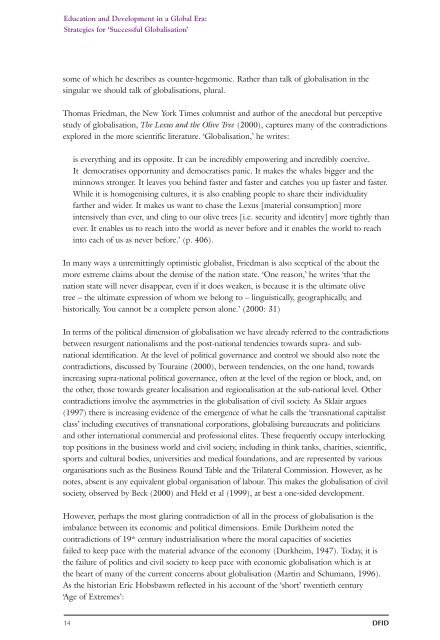education-dev-global-era-69
education-dev-global-era-69
education-dev-global-era-69
You also want an ePaper? Increase the reach of your titles
YUMPU automatically turns print PDFs into web optimized ePapers that Google loves.
Education and Development in a Global Era:Strategies for ‘Successful Globalisation’some of which he describes as counter-hegemonic. Rather than talk of <strong>global</strong>isation in thesingular we should talk of <strong>global</strong>isations, plural.Thomas Friedman, the New York Times columnist and author of the anecdotal but perceptivestudy of <strong>global</strong>isation, The Lexus and the Olive Tree (2000), captures many of the contradictionsexplored in the more scientific lit<strong>era</strong>ture. ‘Globalisation,’ he writes:is everything and its opposite. It can be incredibly empowering and incredibly coercive.It democratises opportunity and democratises panic. It makes the whales bigger and theminnows stronger. It leaves you behind faster and faster and catches you up faster and faster.While it is homogenising cultures, it is also enabling people to share their individualityfarther and wider. It makes us want to chase the Lexus [material consumption] moreintensively than ever, and cling to our olive trees [i.e. security and identity] more tightly thanever. It enables us to reach into the world as never before and it enables the world to reachinto each of us as never before.’ (p. 406).In many ways a unremittingly optimistic <strong>global</strong>ist, Friedman is also sceptical of the about themore extreme claims about the demise of the nation state. ‘One reason,’ he writes ‘that thenation state will never disappear, even if it does weaken, is because it is the ultimate olivetree – the ultimate expression of whom we belong to – linguistically, geographically, andhistorically. You cannot be a complete person alone.’ (2000: 31)In terms of the political dimension of <strong>global</strong>isation we have already referred to the contradictionsbetween resurgent nationalisms and the post-national tendencies towards supra- and subnationalidentification. At the level of political governance and control we should also note thecontradictions, discussed by Touraine (2000), between tendencies, on the one hand, towardsincreasing supra-national political governance, often at the level of the region or block, and, onthe other, those towards greater localisation and regionalisation at the sub-national level. Othercontradictions involve the asymmetries in the <strong>global</strong>isation of civil society. As Sklair argues(1997) there is increasing evidence of the emergence of what he calls the ‘transnational capitalistclass’ including executives of transnational corporations, <strong>global</strong>ising bureaucrats and politiciansand other international commercial and professional elites. These frequently occupy interlockingtop positions in the business world and civil society, including in think tanks, charities, scientific,sports and cultural bodies, universities and medical foundations, and are represented by variousorganisations such as the Business Round Table and the Trilat<strong>era</strong>l Commission. However, as henotes, absent is any equivalent <strong>global</strong> organisation of labour. This makes the <strong>global</strong>isation of civilsociety, observed by Beck (2000) and Held et al (1999), at best a one-sided <strong>dev</strong>elopment.However, perhaps the most glaring contradiction of all in the process of <strong>global</strong>isation is theimbalance between its economic and political dimensions. Emile Durkheim noted thecontradictions of 19 th century industrialisation where the moral capacities of societiesfailed to keep pace with the material advance of the economy (Durkheim, 1947). Today, it isthe failure of politics and civil society to keep pace with economic <strong>global</strong>isation which is atthe heart of many of the current concerns about <strong>global</strong>isation (Martin and Schumann, 1996).As the historian Eric Hobsbawm reflected in his account of the ‘short’ twentieth century‘Age of Extremes’:14 DFID





